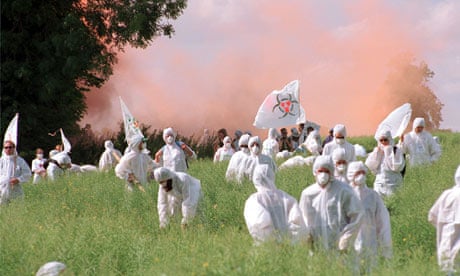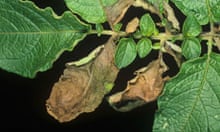Crop scientists have appealed to anti-GM protesters not to trash a field trial of genetically modified wheat at a day of action later this month.
Researchers wrote to campaigners on Tuesday and also recorded a video plea, making a move to address the concern of campaigners and thus save their experiments. The plant biologists at Rothamsted Research, the government-funded agricultural centre in Hertfordshire, invited protesters to discuss their objections instead of uprooting the crops on 27 May.
They took the unusual step of filming an appeal after campaigners, with the slogan "Take back the flour", pledged to pull up the wheat plants. One welcomed the offer to meet, but said the scientists had already made their position clear by planting the crops in the first place. The group had no plan to cancel the raid, she said.
On the video, Gia Aradottir, a biologist specialising in insects, said: "We know we cannot stop you taking the action you are planning to take, but please reconsider before it's too late, and before several years of work to which we have been devoting our lives will be destroyed forever."
Lucy Harrap, involved with the mass action Take back the flour, said it was preparing a response.
"We are really pleased they want to engage in a discussion. But we know that talking to them is not going to change their minds. They've declared their position because they have already put the plants in the ground."
The campaigners fear genes from the GM wheat will escape and contaminate conventional wheat. Wheat self-pollinates, so it cannot cross with other plants. To prevent stray pollen the Rothamsted scientists have surrounded the trial plots with 10 metres of barley and three metres of conventional wheat.
No cereals or grasses are grown within 20 metres of the border. Wheat pollen is heavy and travels at most 12 metres.
This new variety of GM wheat has a gene making it release an odour given off by aphids when under attack. The odour warns other aphids to flee.
The same pheromone is released by more than 400 plant species. Scientists hope the GM crop will repel aphids and so not require insecticide. The plants, grown on eight Rothamsted plots, are to be harvested at the end of July and then destroyed.
Toby Bruce, research team leader, said:"We're deeply concerned that our field experiment has come under threat like this. "We hope this video might get the message across, because there is probably more common ground between us and these campaigners than they realise. We both want more environmentally friendly agriculture, we just see different ways of getting there.
"The trial will compare two versions of wheat that release high and low levels of the aphid alarm pheromone. Scientists will check the plants to see which have more aphids on them, and whether those aphids are killed by insect predators and parasites that are attracted by the pheromone."
The trials are close to another plot of land where plants have been grown in an experiment that dates back to 1843, raising concerns that protesters might trample those if they invade the site.
In the video appeal, Lesley Smart, a field entomologist at Rothamsted, urged the campaigners to allow the trial to continue.
"You seem to think, even before we've had a chance to test it, that our GM wheat variety is bad. How can you know this? It's clearly not through scientific investigation, because we've not even had the chance to do any tests."
In lab trials at Rothamsted, the GM wheat crops were covered in fewer aphids, and more insects that kill the pests, suggesting the crops might fare better on farms. But without the field trials, it is impossible to know how the crop will grow outside.
Previous work by Jonathan Gershenzon, director of the Max Planck Institute for Chemical Ecology in Jena, Germany, found that plants modified to carry the odour gene did not repel aphids, perhaps because the scent was released continuously instead of in bursts as happens when aphids are attacked.
But Gershenzon added that the Rothamsted experiments could answer valuable questions his own work could not.
"The plants may well attract the aphids' enemies and that is an exciting reason to look at this further," he said.
Gershenzon backed the scientists' appeal to the campaigners and said he hoped the crops would not be uprooted. "Many of the campaigners are well meaning and engaging with them is the right thing to do.
"We should encourage this kind of innovation, but we should also encourage discussion with people and be open with them."



